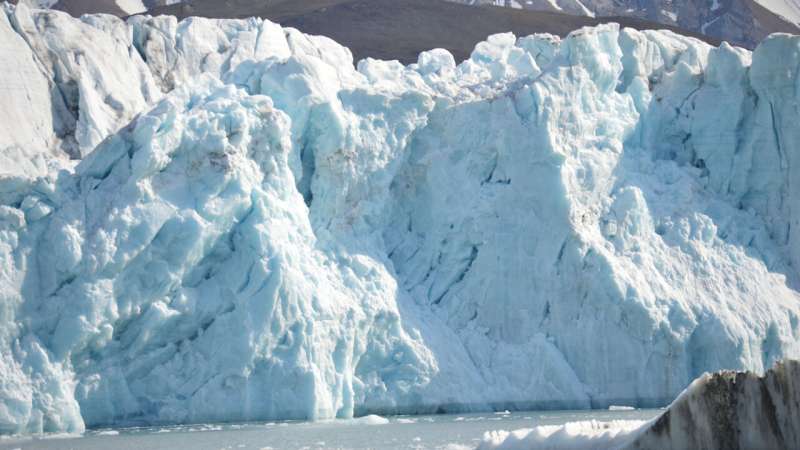Air bubbles sound climate change's impact on glaciers

As the world's temperatures rise, tidewater glaciers are receding and melting, releasing air trapped in the ice. Scientists can listen to the release of the air and potentially use the sounds to help them gauge the impact of climate change on the ice floes.
During the 181st Meeting of the Acoustical Society of America, which will be held Nov. 29-Dec. 3, Hayden Johnson, from the University of California, San Diego, will discuss how sound can be used to estimate glacial melting induced by climate change. The talk, "Spatial variation in acoustic field due to submarine melting in glacial bays," will take place Friday, Dec. 3.
Hari Vishnu, from the National University of Singapore, Grant Deane, from the Scripps Institute of Oceanography, and their research team investigated glacial ice melting that releases acoustically distinct pressurized underwater bubbles.
Air trapped with ice below the glacier surface becomes a compressed bubble-ice mixture that builds pressure during the long passage to the glacier terminus. The glacier ice holds ancient bubbles of air that can be up to 20 atmospheres of pressure and generate detectable sounds when they are released as the ice melts.
"We observed that the intensity of the sound generated by a melting terminus tends to increase as the water temperature increases," said Deane. "This makes sense, because we expect the terminus to melt faster in warmer water, releasing bubbles more rapidly into the ocean and generating more sound."
The team found as the recording array was moved further from the glacier, the variation in the acoustic melting did not follow a uniform trend.
Moreover, the acoustic intensities at different glaciers clustered in different levels. These observations indicate that the geometry of the glacier-ocean interface, the temperature and salt composition of the underwater sound channels, and the presence of floating ice impact the recorded acoustic measurements.
Their experiments will permit the monitoring of climate change's impact on glaciers.
"Recording the underwater sounds from a melting terminus will open the door to long-term acoustical monitoring of ice loss, and how it is linked to water temperature," said Deane. "The endgame here is to establish long-term recording stations for underwater sound around glaciers such as those in Greenland and Svalbard, to monitor their stability over time."
More information: acousticalsociety.org/asa-meetings/
Provided by Acoustical Society of America




















